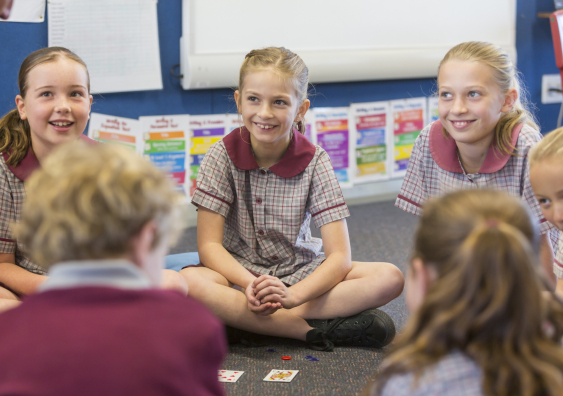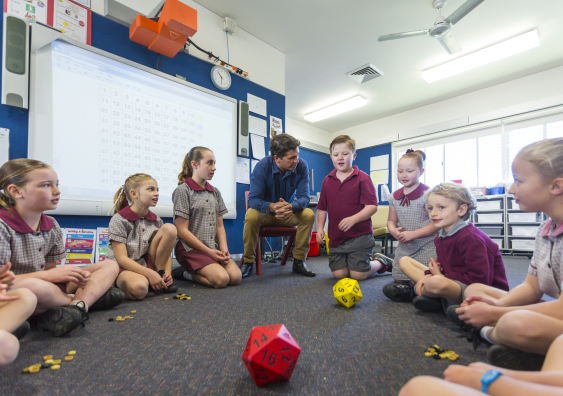Critical mathematical thinking skills create more engaged citizens
Developing children’s understanding of maths helps them navigate personal, social and political challenges, says an expert from UNSW Arts, Design & Architecture.
Developing children’s understanding of maths helps them navigate personal, social and political challenges, says an expert from UNSW Arts, Design & Architecture.

Samantha Dunn
UNSW Arts Design & Architecture News & Content Coordinator
0414 924 364
samantha.dunn@unsw.edu.au
Improving children’s understanding of maths helps them develop more balanced decision-making, says a UNSW expert in mathematics education. Using maths critically allows us to consider complex personal and socio-political issues, such as health, the economy and the environment, says Professor Kim Beswick, Director of the Gonski Institute and Head of the School of Education at UNSW.
“Mathematical practices are fundamental to navigating our everyday lives. Maths helps us make well-founded judgements about all sorts of [day-to-day] things, including food, distance and time, costs, loans and sports, all of which need to be considered in the context of other considerations and priorities,” she says. “Few decisions are purely mathematical; they have individual and societal impacts beyond the maths that also need to be considered.”
With today’s world characterised by rapid change, it’s important we equip children to engage with its challenges, she says.
“We constantly hear data about different elements of our lives, from accelerating rates of global warming to the prevalence of vaping and its health risks,” she says.
“If people don’t understand the maths, or they’re not confident in it, they can’t engage sensibly in conversations about what might or might not be effective [interventions] or understand the degree of [their] personal risk.”
Read more: The quest to make Australia great at maths again.
Prof. Beswick’s research examines the beliefs and knowledge underpinning maths teaching, particularly in relation to teachers’ expectations of and aspirations for their students. A maths teacher for more than 13 years, she’s committed to enhancing the quality of maths education for all students.
Teaching children critical mathematical thinking lays the foundation for sound decision-making and problem-solving, she says. Critical mathematical thinking is using maths techniques and reasoning across broad contexts.
“It's a really powerful way of describing, thinking about and approaching the world, of finding patterns and forecasting different outcomes,” she says. “It’s key to finding solutions to many existing and emerging national and international challenges, including how to respond to technological, environmental, economic and social change.”

It's important that maths is taught in such a way that children understand its first principles “to make sure they can make sense of the calculation, as well as knowing how to do the calculation, and that will help them make sense of the world”, says Prof. Beswick. Photo: Getty Images
Developing the capacity to reflect on the consequences of proposed solutions – social and ethical – is a key feature, she says. “For example, when we asked a class of high school students in Brisbane to consider whether or not residents of flood-affected areas should take up the government’s offer to buy back their properties, they could see, mathematically, that the buy back was good deal, but realised there were other considerations,” she says.
“Can I find somewhere to buy that is not flood-prone and still close enough to work? How will it affect social networks? What childcare and school options are available in an area I could move to? These things affect different individuals differently so there is not one right answer.”
Critical mathematical thinking encourages children to think about the way information is presented or framed. “Of course, real life is messier than maths problems, but critical mathematical thinking encourages kids to consider the assumptions made and their limitations – that’s the critical thinking part,” she says.
“It encourages them to ask the right questions. Do I have all the information I need to understand this? What don’t I know? What should I ask? How can I find out that other information? What other factors should I consider? It's those sorts of questions. Who's got a vested interest in this story I just read in the newspaper?”
“Focusing only on the maths, separate from its applications, results in students thinking maths is irrelevant."
And while it promotes a workforce supported by STEM capabilities, it’s more than that, she says. “[Developing your critical maths thinking] gives you more agency in the world. You can make better arguments. You can understand your medical treatment, or what your bank manager is telling you, what a proposed government policy might mean for you and for others,” she says.
“And you can ask more searching questions. It's what helps you find employment and engage in society as an informed citizen. It makes learning maths meaningful – something you can do to have a positive influence in the world, not simply for academic purposes.”
The results of international student assessment programs, such as the OECD's Programme for International Student Assessment (PISA), indicate that Australian students find mathematical reasoning difficult. “This highlights the urgent need to address teaching practices that promote students’ critical maths thinking within Australian schools,” says Prof. Beswick.
“What happens way too often is that students learn the routine algorithmic material – they learn the processes that get the right answers, they can solve equations, for example – but often when it comes to some real-life problem, they avoid maths. It is the very last resort. They don’t have the depth of understanding that supports confidence.”
It's important that maths is taught in such a way that children understand its first principles “to make sure they can make sense of the calculation, as well as knowing how to do the calculation, and that will help them make sense of the world”, she says.
“There are great teachers out there who do just that, but it doesn’t happen nearly enough. International studies that ask students about what goes on in the classrooms depict a very traditional approach to lessons in Australia.”
The issue is exacerbated by the current teacher shortage that means many teachers are teaching out of area, she says. Typically, in Australian classrooms, maths classes are characterised by studying lots of short problems, “whereas other countries, such as Japan, tend to do fewer problems but spend longer on them”, she says.
“Moving in that direction would be useful so kids can really delve into the problem, and what's going on there, and make sense of it for themselves.” A good teacher can guide in-class discussion about an interesting problem in such a way that children don't waste time following dead ends and get frustrated, she says. “They develop deeper insights and make connections among maths ideas and between those ideas and the ways they can be used.”
Prof. Beswick is partnering with a team of national and international experts on an Australia Research Council (ARC) project DP220101015, 'Enabling students' critical mathematical thinking', which will generate new insights into teaching practices that can promote or inhibit students’ development of critical mathematical thinking.
Introducing children to new mathematical concepts through more complicated problems – “the good stuff” – without so many broken down steps, rather than starting with easier problems and getting progressively more complex, is one possible approach, she says.
“Focusing only on the maths, separate from its applications, results in students thinking maths is irrelevant and, for too many, not something they want to pursue.”
You could teach or reinforce the necessary tools along the way, she says. “It means that students might spend a whole lesson on one problem or issue or maybe longer. But they will have learned [the concepts involved] in a much deeper way. Practicing skills is important but when students understand the relevant concepts less is needed.”
Children are then building on their understanding of maths beyond the utilitarian, she says. “It is about [supporting critical] thinking, not just crunching through processes – doing what a calculator can do – and I think that's what makes maths interesting,” she says.
“And that's what will inspire more kids to study maths for longer which would also help our teacher shortage. It would certainly give us a more mathematically capable citizenry – something that we desperately need.”
Teachers’ beliefs around student capability also affects their approach to teaching, including their likelihood to teach in a way that fosters critical maths thinking, she says.
“People close doors to students … Too often they get classified rather than taught. The answer is to move them down a level rather than help them make up what they might have missed or explain things another way.”
Prof. Beswick grew up in a farming community in Tasmania in which not many students went on to university. She experienced firsthand the negative bias associated with teachers’ expectations as well as the positive impact of engaged teaching.
In senior secondary school, she elected to take the most demanding maths subject without the necessary pre-requisites. Her maths teacher worked with her for a lunchtime every week to help her understand the concepts that didn’t make sense to her.
“He was so patient with me … I would take a list of questions to him, and he would work through them all,” she says. “I remember the lesson where he explained the limit theorem in calculus. And he did it so well, it struck a chord with me. I just thought that is beautiful. I want to do maths forever.”
The experience changed her career trajectory and invoked a lifelong passion. And while not all maths has real-world relevance, teaching the subject should include the development of critical thinking.
“I’d be the first to say there is also value in learning pure maths,” she says. “Pure maths, like art or music, is a part of our cultural heritage – it can be a thing of beauty – and not everyone’s going to enjoy it or appreciate it, but they should be given the opportunity to access it as part of our culture. For most students, seeing the way maths can be used to help individual and societal decision-making will be what inspires them to study the subject.”